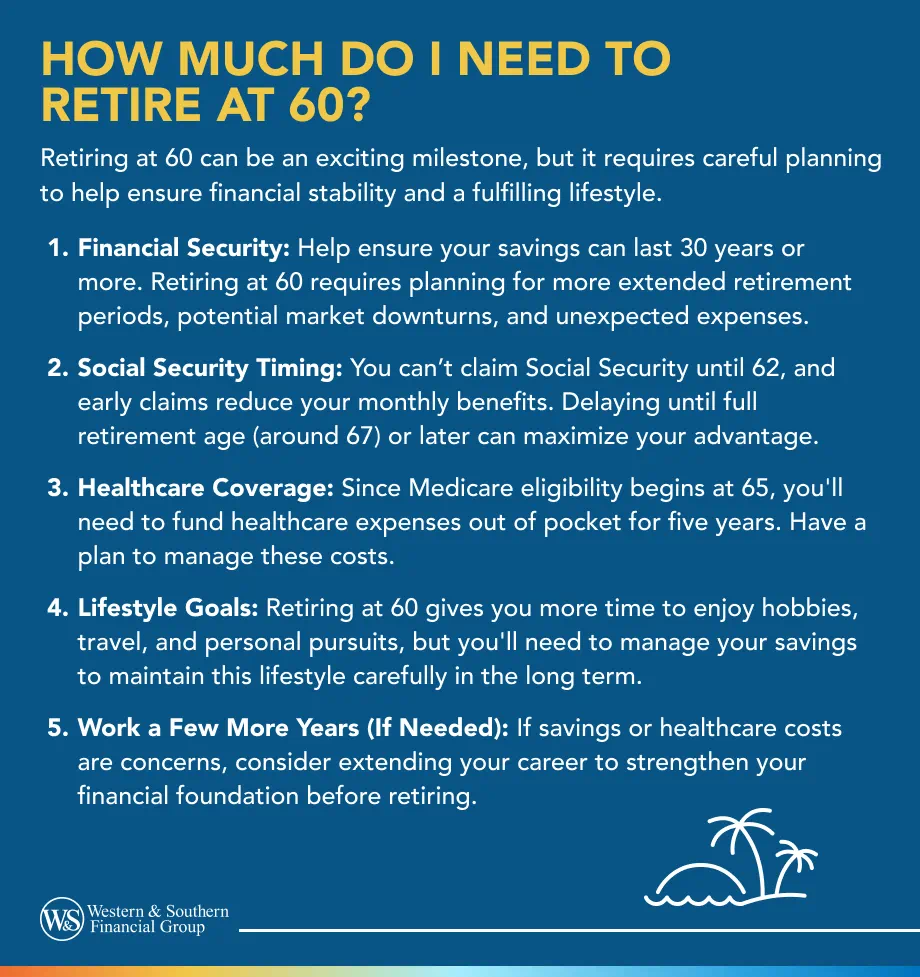

Key Takeaways
- Retiring at 60 requires enough savings to last 30 years, considering potential market downturns and unexpected expenses.
- You can't claim Social Security benefits until you are 62; taking them early reduces your monthly payments.
- You need to plan for healthcare costs until you become eligible for Medicare at 65, which can be expensive if you retire at 60.
- Aim for at least eight to ten times your annual income in savings by 60, with adjustments based on your lifestyle and location.
- Plan for a retirement that could last 30 years or more, factoring in inflation to ensure your savings maintain their purchasing power.
Should I Retire at 60?
Deciding whether to retire at 60 is a personal choice that depends on your financial plan, health, and lifestyle goals. Here are a few things to think about:
- Financial Security: Do you have enough savings to last 30 years? Retiring at 60 means your savings must stretch further, so plan for potential market downturns and unexpected expenses in retirement.
- Social Security: If you retire at 60, you can't claim Social Security benefits until at least 62, and taking them early will reduce your monthly payments; waiting until full retirement age (around 67) or later will increase your benefit.
- Healthcare: As mentioned, you’ll need to cover healthcare costs out of pocket until you’re eligible for Medicare at 65. Do you have a plan for this expense?
- Lifestyle Considerations: Retiring at 60 gives you more time to enjoy retirement, travel, and pursue hobbies. However, it also means you’ll need to be more careful with your finances to ensure your savings last.
If you're ready and financially secure, retiring at 60 could be ideal. However, if you're concerned about savings or healthcare costs, consider working a few more years to strengthen your financial foundation.
What Are the Average Retirement Savings at 60?
On average, Americans approaching retirement at 60 have around $200,000 to $250,000 in retirement savings. Still, financial experts often recommend having at least eight times your annual salary saved by this age to maintain your current lifestyle.1
If earning a current salary of $100,000 a year, you should aim for at least $800,000 to $1 million in retirement savings by 60. This figure isn't set in stone—it's a guideline. Your actual needs could be higher or lower depending on where you plan to live, healthcare costs, and your desired standard of living.
Retiring at 60 is a dream for many, but it requires careful planning and disciplined saving. Tailoring your retirement plan to your unique circumstances is essential. Assess your savings, estimate your future needs, and consider the factors that could impact your retirement for a secure and comfortable lifestyle.
Factors That Affect How Much You'll Need To Retire
Planning for retirement is exciting, but it raises many questions, including, "How much do I need to retire at 60?" The answer varies based on your unique life, retirement goals, and financial situation. Let's explore key factors influencing how much you'll need to retire comfortably.
- Expected Lifespan: Consider how long you might live based on your family history and overall health. If you retire at 60, you could live another 20 to 30 years, so plan to avoid outliving your savings.
- Lifestyle Choices: Your retirement lifestyle will significantly influence how much you'll need. The more you plan to spend, the larger your retirement fund will need to be.
- Debt and Expenses: Carrying debt into retirement can strain your finances, so it's essential to account for expenses like a mortgage or car payments and ensure you have enough savings to cover daily living costs like food, utilities, and transportation.
- Healthcare Costs: Healthcare costs tend to rise as you age, so it's wise to budget for unexpected expenses. While Medicare starts at 65, you'll need to cover the gap from 60 to 65 with private insurance or other options, which can be expensive.
- Housing Costs: Will your home be paid off when you retire? If not, housing costs like your mortgage, property taxes, and maintenance could be a big part of your retirement budget.
- Inflation: Inflation can gradually erode your purchasing power, affecting your savings over time. It's essential to have a retirement plan that includes a strategy to keep up with inflation.
- Investment Returns: The returns on your investments will affect how much you need to save. Regularly reviewing and adjusting your investment strategy can help keep you on track.
Many dream of retiring at 60, but it requires careful planning, including considering factors like lifespan, lifestyle, and expenses. It is always wise to consult with a financial planner who is a retirement expert for personalized advice.
Calculate Your Future Expenses
Understanding your future expenses is crucial when planning for retirement at 60. This step helps you determine how much money you'll need to maintain your desired lifestyle without running out of funds.
- Current Living Expenses: Assess your monthly living expenses, including housing, utilities, groceries, transportation, insurance, and other regular bills. If you're already tracking expenses, use those numbers as a baseline.
- Estimate Post-Retirement Changes: Retirement can change your expenses; for instance, commuting costs may drop while healthcare expenses could rise. Consider how your lifestyle might shift and adjust your budget accordingly.
- Healthcare Costs: Healthcare can become a significant expense as you age, even with Medicare. Budget for potential out-of-pocket costs and research average healthcare expenses for retirees in your area, factoring in inflation.
- Inflation: Over time, the cost of living generally increases due to inflation. To ensure your retirement savings keep up, estimate an annual inflation rate (usually around 2-3%) and apply it to your current expenses. This adjustment will give you a more accurate picture of your needs.
- Longevity: Plan a retirement that could last 30 years or more to avoid outliving your savings. With healthcare advancements, many people live well into their 80s and 90s.
- Desired Lifestyle: Consider how you want to spend your retirement and the costs involved. Be realistic about your lifestyle choices, whether it's frequent travel, new hobbies, or supporting family members.
- Emergency Fund: An emergency fund is crucial in retirement, just as during your working years. Save some of your savings for unexpected expenses like home repairs or medical emergencies.
By carefully calculating your future expenses, you'll understand how much you need to save for a comfortable retirement at 60.
Estimate your retirement savings progress with our retirement calculator. Calculate Savings
Add Up All Your Potential Income Sources
One crucial step when planning for retirement at 60 is adding all your potential income sources. Understanding where your money will come from and how much you can expect is critical to building a sustainable retirement plan. Here are the primary sources to consider:
Social Security Benefits
Social Security is vital for income in retirement, but at 60, you’re not yet eligible for full benefits. Estimating your monthly benefit based on your earnings history and when you plan to start collecting is essential.
Retirement Accounts
Your 401(k), IRA, and other retirement accounts will be crucial for funding your retirement. A common approach is the 4% rule, which requires you to withdraw 4% of your savings annually to help ensure your funds last.
Pension Income
A pension can provide a reliable regular income stream account with a fixed monthly amount to cover essential expenses; check if it includes cost-of-living adjustments to maintain your purchasing power over time.
Savings and Cash Reserves
Your savings and cash reserves are for unexpected expenses or large purchases; keep some easily accessible accounts, like a high-yield account, for quick access to cash when needed.
Annuities
Annuities can offer a steady income stream, with single premium deferred annuities (SPDAs) deferring payments and immediate annuities starting payments right away. This makes them a valuable option to supplement your income and help ensure you don't outlive your savings.
Part-Time Work
Many retirees find part-time work a great way to stay active and boost their income, covering discretionary expenses or delaying withdrawals from retirement accounts. A part-time job can also offer social benefits and help keep you engaged in your community.
Adding up all your potential annual retirement income sources gives you a clearer picture of your financial future. Understanding what each source can contribute, you’ll be better equipped to create a retirement plan to live comfortably and confidently at 60 and beyond.
Planning Retirement Withdrawals
Retiring at 60 is a common goal, but it requires careful planning to ensure your savings last. The key is determining how much you can safely withdraw each year to avoid running out of money while enjoying retirement. Here's what you need to know about planning your retirement withdrawals.
- Understanding the 4% Rule: The 4% rule suggests withdrawing 4% of your retirement savings annually, adjusted for inflation, to last around 30 years, but it’s not foolproof due to market performance and unexpected expenses.2
- Factor in Social Security and Other Income Sources: Coordinate your retirement withdrawals with other income sources, like Social Security, which is lower if taken at 62 instead of full retirement age or 70. Use pensions, annuities, rental income, or part-time work to minimize tapping into your savings.
- Consider Required Minimum Distributions (RMDs): If you have a traditional IRA or 401(k), you must start taking required minimum distributions (RMDs) at age 73. Missing them can lead to penalties, so plan to manage your tax burden, especially if retiring at 60.
- Adjusting for Market Conditions: Market fluctuations can impact retirement savings, so a flexible withdrawal strategy that adjusts to market conditions—taking less during downturns and more in better years—can help extend your savings.
- Don’t Forget About Taxes: Withdrawals from tax-deferred accounts like traditional IRAs and 401(k)s are subject to income tax, so it's smart to work with a tax advisor to minimize your tax burden and maximize your spending power.
- Regularly Review and Adjust Your Plan: Retirement requires ongoing review and adjustment of your withdrawal strategy to ensure long-term financial security. You must also adapt to life changes, market conditions, and spending habits to maintain your desired lifestyle.
Tips for Retiring Comfortably at 60
Retiring at 60 can be exciting, allowing you to enjoy life on your terms. However, ensuring a comfortable retirement requires careful planning and intelligent financial decisions. Here are some essential tips to help you retire comfortably at 60:
- Start Planning Early: Plan retirement early to give your money more time to grow. Thanks to compound interest, consistent contributions to employer-sponsored plans like a 401(k) can significantly impact your average savings.
- Calculate Your Retirement Expenses: Understanding your future expenses is crucial in retirement planning. Estimate your monthly and annual costs, considering factors like housing, healthcare, and potential inflation while accounting for any significant one-time expenses.
- Maximize Your Retirement Accounts: Maximize your retirement savings by contributing as much as possible to your accounts. If you're 50 or older, catch-up contributions in a 401(k) or IRA can significantly enhance your savings as you approach retirement.
- Consider Healthcare Costs: Healthcare can be a significant expense in retirement, especially before Medicare eligibility at 65, so explore coverage options like private insurance or a spouse’s plan and budget for these costs, including a reserve for unexpected medical expenses.
- Diversify Your Income Sources: Relying on a single income source in retirement is risky, so it's essential to diversify. Consider multiple sources like Social Security, pensions, retirement accounts, annuities, and even part-time work to enhance financial stability and manage risk.
- Reduce Debt Before Retiring: Carrying debt into retirement can strain your finances. Aim to pay off high-interest debt and consider reducing or refinancing your mortgage to free up more income to enjoy retirement.
- Reevaluate Your Investment Strategy: As you near retirement, reassess your investment portfolio to balance growth with protection from market volatility, using a mix of stocks, bonds, and other assets, and consult a financial advisor to align your strategy with your goals.
- Plan for Longevity: With people living longer, your retirement savings may need to last 20 to 40 years, so plan for a longer retirement by saving more, adjusting your withdrawal rate, or considering an annuity for guaranteed lifetime income.
- Create a Withdrawal Strategy: How and when you withdraw from retirement accounts can significantly impact your financial health. Consider RMDs, Social Security timing, and the sequence of account withdrawals to create a strategy that minimizes taxes and maximizes savings longevity.
- Stay Flexible: Life is unpredictable, so be flexible with your spending, open to lifestyle changes, and regularly revisit your retirement plan to make necessary adjustments and stay on track with your retirement journey.
Following these tips and planning carefully, you can work towards a comfortable and fulfilling retirement at 60. Remember, the key is to start early, stay disciplined, and keep your long-term goals in mind.
Conclusion
Retiring at 60 is a goal within reach, but it requires careful planning and regular reassessment of your financial strategy. Start planning today to ensure you can enjoy your retirement comfortably.
Tailor your retirement strategy to achieve financial stability at 60. Start Your Free Plan
Frequently Asked Questions
Is $1,000,000 enough to retire at 60?
Whether $1,000,000 is enough to retire at 60 depends on your lifestyle, expenses, and additional income sources like Social Security or pensions. It's crucial to assess your spending needs, healthcare costs, and potential investment growth to determine if this amount will support a comfortable retirement.
How to retire at 60 with no money?
Retiring at 60 without savings requires maximizing Social Security benefits, reducing living expenses, and possibly continuing part-time work. Consider government assistance programs and relocating to a more affordable area.
Sources
- Here’s how much money you should have saved at every age. https://www.cnbc.com/select/savings-by-age.
- What is the 4% rule? https://www.cnn.com/cnn-underscored/money/four-percent-rule-retirement.







